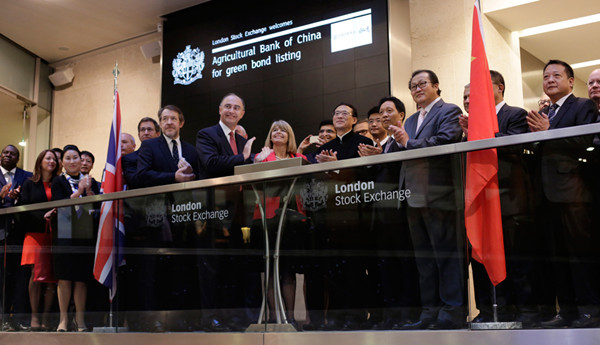
Bank of China entered a float in the 2017 Lord Mayor's Show in the City of London. (Photo provided to chinadaily.com.cn)
Economic uncertainty has led to the UK tumbling down the rankings of attractive destinations for outward direct investment but financial institutions still swear by importance of the UK capital's banking sector
Chinese banks have continued to expand in London, following an increase in UK-China trade and investment, something that appears to go against the economic uncertainty expected as a result of Britain's departure from the European Union.
Chinese banks were late to arrive in London but experts say their presence has helped maintain the British capital's role as a global financial hub at a time of great political and economic uncertainty in the United Kingdom.
"We are fully committed to the UK market," said Zhu Jianhai, head of corporate banking at Agricultural Bank of China (UK) Ltd. "The UK's financial services sector has evolved through 100 years to build a robust financial infrastructure, which is the solid backbone of financial activities. This is one advantage that Brexit cannot take away."
Agricultural Bank of China, which established its UK subsidiary in 2011, is preparing to open a London branch in the near future, which will increase the number of services and products it offers.
In the past four years, four Chinese banks have established London branches; China Construction Bank, Industrial and Commercial Bank of China, China Merchants Bank, and Bank of Communications.
Meanwhile, Bank of China, which established a London branch in 1946, has become a respected player in London and Sun Yu, its general manager, is chairman of the UK's Association of Foreign Banks.
Sun said London is an irreplaceable platform for Chinese banks wanting to internationalize, and Chinese banks have helped London better interact with China, its economy, and its stock and bond markets.
One major focus of Chinese banks in London has been the provision of lending and finance to their existing Chinese clients, which are increasingly trading and investing in the UK, building on China-UK financial collaboration that began with President Xi Jinping's state visit to the UK in October 2015.
So far, China has invested more than $17 billion in the UK, which is more than it has invested in any other European country, other than Germany.
Chinese banks have grown in London, thanks to the city's emergence as a Western renminbi offshore hub and it is now the biggest offshore renminbi foreign exchange trading hub outside Asia. Data for the first quarter of 2017 collected by the Society for Worldwide Interbank Financial Telecommunication shows 36.3 percent of global offshore renminbi exchange transactions were conducted through London.
One milestone that facilitated London's offshore renminbi activities growth was the appointment of an official renminbi clearing bank in London by China's central bank, the People's Bank of China.
China Construction Bank, the appointed clearing bank, was able to settle transactions directly with PBoC, improving the efficiency of foreign exchange clearing.
China Construction Bank has cleared 20 trillion yuan ($1.5 trillion) of transactions since June 2014, when it received the appointment.
According to CCB statistics, London's offshore renminbi transactions have remained high, despite Brexit uncertainties. Between August 2016 and August 2017, offshore renminbi transactions in London stood at 800 million yuan, which was a 20 percent year-on-year growth.
Although Chinese banks' London activities are, so far, focused mainly on straight banking activities, such as lending, financing, bond issues, and foreign exchange, the bank is also constantly innovating new services and preparing more complex loan syndication and derivative activities.
Just last month, Bank of China launched a private banking service in London with the aim of tapping into the burgeoning pool of wealthy Chinese people living in the UK or visiting it.
The Bank of Communications plans to increase its London-based financial activities by getting involved in foreign exchange trading, liquidity management for corporate clients, the development of new investment products, and debt capital market activities, said John Liu, general manager of its London Branch.
Chinese banks are also looking to become lead loan syndication banks, to finance larger projects, such as sizable Chinese investments in the UK or infrastructure projects in the area covered by the China-led Belt and Road Initiative.
Instead of financing a project themselves, Chinese banks would conduct the legal, financial and technical due diligence on deals, understand their risk and profitability profile, and present the information to international banks.
"One factor that encouraged them to initiate this shift in their business model is the enormous scale of the Belt and Road Initiative," said David Milligan, a banking and finance lawyer at Norton Rose Fulbright. "Because the scale is so big, Chinese banks' previous approach is not sustainable."
Ben Robinson, a senior economist at the London-based think tank Official Monetary and Financial Institutions Forum, agreed.
"The overall attractiveness of the UK means Chinese banks can use it as a base to increase their operations in the U.S., Middle East, Africa, Asia and other areas Chinese companies are expanding into," he said.



















































